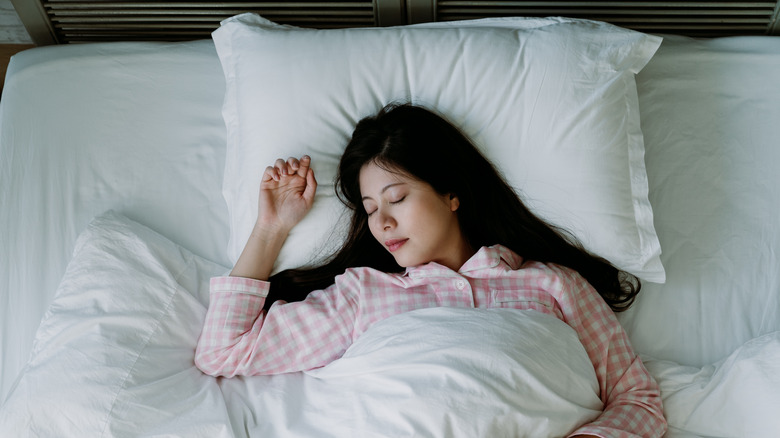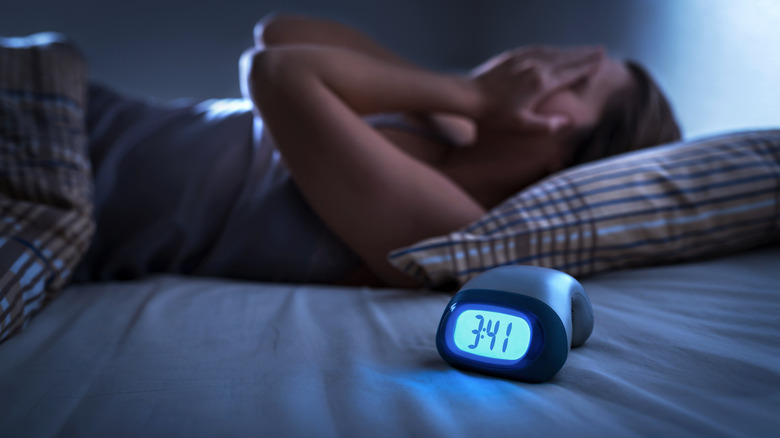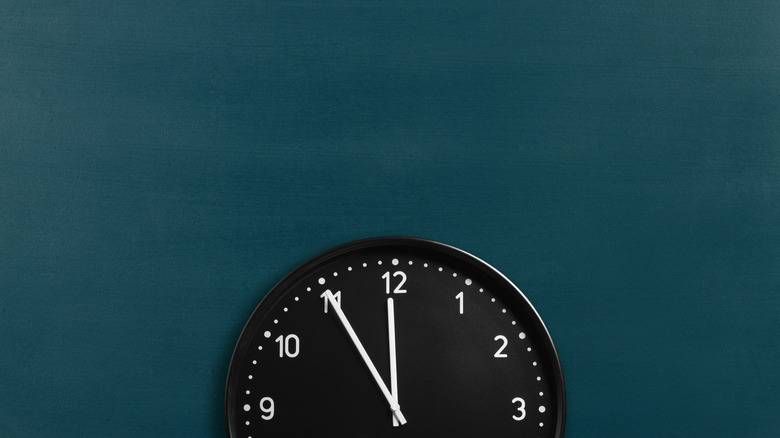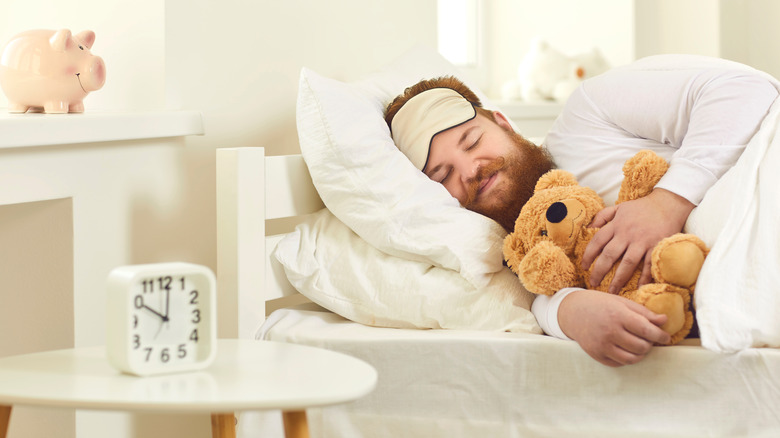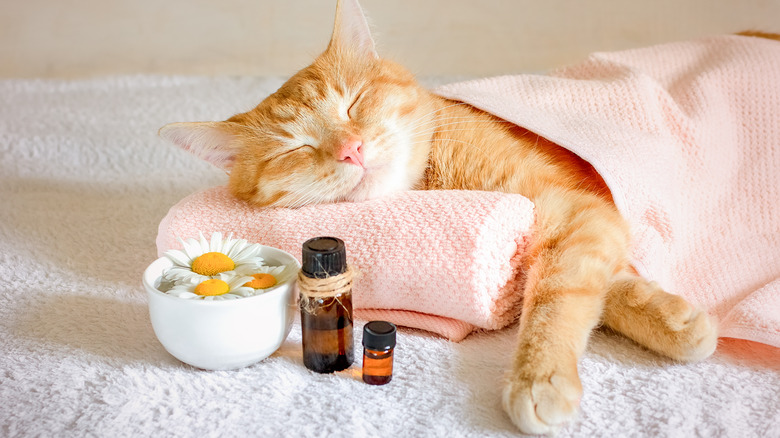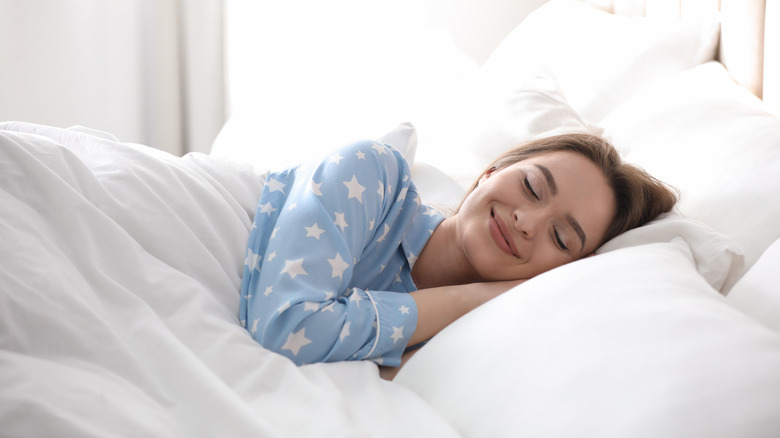Tips To Help You Sleep When You're Away From Home
When people are in their early twenties, it may be common practice to stay out all night, eat like Oscar the Grouch ("I love trash!"), and still hop out of bed the next morning with glowing, dewy skin and a youthful pep in their step. But as we get older, those days begin to appear smaller and smaller in our respective rear-view mirrors. Now, it seems we need to perform a full, choreographed song and dance every evening if we stand a chance of feeling well-rested come morning.
That's okay, though! In fact, maybe you've even grown to love and look forward to your bedtime routine. And why shouldn't you? This singular and soothing process designed by you, for you, is an excellent expression of self-care. But sleeping away from the comfort of your own home — whether for work, vacation, or a family visit — is likely to demonstrate just how delicate the ritual is.
The first-night effect blues
Our bodies are aligned with a circadian rhythm — a 24-hour cycle of sleep and wakefulness — that works best when a routine is established and maintained. So it's no wonder that making changes to our sleep schedule tends to elicit fitful and fragmented sleep. There's a pretty primal explanation for this, and it's referred to by sleep scientists as "the first-night effect".
When we sleep, we are at our most vulnerable. At home, we sleep more soundly because we know the lay of the land and can easily keep tabs on any environmental changes that could pose a potential threat to our safety. In a new place, however, there are loads of unknown variables. Dr. Michael Breus, a sleep specialist, explained to Livestrong that during our first night sleeping in a new environment, only half of our brain fully goes to sleep while the other half remains alert, looking out for anything that might cause us harm.
And unfortunately, it is not necessarily smooth sailing once you get the first night out of the way either. There are plenty of factors in your new environment that may affect your sleep quality. Fortunately, there are a few things you can do to maintain some elements of your routine and ensure you get the best possible sleep while you're away from home.
Stick to the plan, man.
If you're not staying at home, that likely means your days are looking quite different from your "norm". Maybe you're on vacation, having some day drinks and eating whatever you please. (Good for you!) Or perhaps you're in a new place, performing out-of-the-ordinary tasks in order to meet work or family obligations. But whatever your reason for traveling, the fact of the matter is that changes to your daily routine — even the fun ones — can throw a wrench into your sleep schedule. So while your days may stray from their usual course, it's important to keep your nights as normal as possible.
The easiest way to do that is by sticking to your typical time schedule. According to Livestrong, something as simple as eating dinner earlier or later than usual can have a significant impact on your circadian rhythm. In order to give yourself the best shot at a restful night's sleep, try to eat dinner, turn the TV off, brush your teeth, and get in bed around the same times as you would at home.
Bring your binky!
Okay, so you probably don't have a binky anymore, but more than likely, there is something you keep in your bed at home that brings you comfort, and having it with you helps you sleep better. Maybe it's a particular pillow or pillowcase, a blanket, an eye mask, or the pair of socks or pajamas you wear to bed most often. Whatever it is, be sure to take it with you when you hit the road, if possible. Bring a few of those things! Bring a scent that feels like home.
Surrounding yourself with familiar items sends a signal to your brain that you are in a place free from danger. Those feelings of familiarity will give your mind a break from that first-night vigilance. This is because familiar items will help you feel more comfortable and secure in the new environment, Dr. Breus said to Livestrong.
Maintain sleep hygiene every way you can
The term "sleep hygiene" has been floating around since the late 19th century, but it took on the modern meaning we use today in 1977 when Dr. Peter Hauri's monograph Current Concepts: The Sleep Disorders detailed his rules for successful sleep, or sleep hygiene (per Sleep Station). Maintaining good sleep hygiene means keeping a bedroom environment and daily routine that encourages good, uninterrupted sleep.
Everyone's sleep hygiene looks a little different, but you can do your best to uphold yours by keeping your new bedtime backdrop as close to the one you have at home as possible. This means adjusting the thermostat to your liking, pulling the curtains closed or wearing an eye mask, turning on your favorite sleep sound or popping in some earplugs, turning electronics off before bed, and setting an alarm to wake up close to the time you usually do (per Healthline).
Good advice for good sleep
Getting good sleep is essential to our physical and mental health. Without it, we can feel sluggish, cranky, brain-foggy, and downright rundown (per National Heart, Lung, and Blood Institute). But because we are — by nature — lovely little creatures of habit, establishing and sticking to a bedtime routine that works for you means putting yourself in the best position to get the most out of your sleep.
Of course, life happens and every day can't possibly unfold in the same way it did the day before. We have events, business trips, and vacations that can take us away from our cozy nest and out into the big, wide unfamiliar. (Lucky us!) But instead of letting a few nights away from home mess with your good habits, you can take your ritual on the road with you. Continuing with your self-made schedule for successful sleep, even while traveling, can reduce jet lag and help you get through the first night, and every night after, with ease.
Keep your sleep routine and snooze on!

